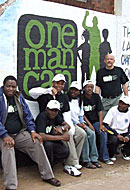 This was the question that researchers set out to answer in early 2009. The research team contacted a random sample of men and women who had participated in One Man Can training in Limpopo, KZN and Eastern Cape. In total, they spoke to 181 people, who shared feedback on their attitudes and behaviours after the workshops.
This was the question that researchers set out to answer in early 2009. The research team contacted a random sample of men and women who had participated in One Man Can training in Limpopo, KZN and Eastern Cape. In total, they spoke to 181 people, who shared feedback on their attitudes and behaviours after the workshops.
Researcher, Chris Colvin, notes that the research shows that “there is a great diversity in attitude and practice among men with regards to HIV/AIDS, gender and human rights.”
He also points out that there is often inconsistency between what men say and do, and “as often as not this means that men are acting more responsibly and more positively for their own health and other’s than they might realise or expect.”
Results
Reach
The research showed that Sonke has managed to reach almost 4500 people through OMC events and activities. That’s more than double the intended target!
HIV
In terms of attitudes and behaviours around HIV, the researchers found that between 24 and 25% of participants have been tested since their involvement in OMC activities. One participant noted, “people now have that courage in themselves to go and test.” And 61% of participants reported that they have increased their own condom use.
Gender violence
With regards to gender violence, the research showed significant changes in attitudes. Half of those surveyed said that they had witnessed acts of gender violence since the workshops and 81% of these said that they had reported violence to police, community structures or NGOs.
Overall Impact
The participants in the study viewed the OMC activities as positive and informative with 83% saying that they spoke to members of their families and communities about the things they discussed and learnt. 86% also felt that the campaign was having an impact on the community.
The research shows that the OMC campaign has been effective in educating men and women and mobilising members of CBOs and communities. It also provides evidence that the campaign has encouraged families and communities to discuss difficult topics like gender violence and HIV.

